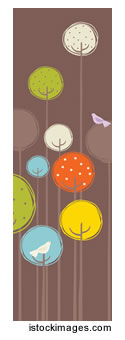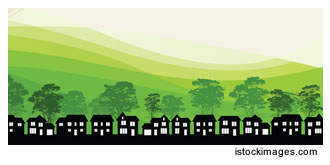God gives His human creatures a special responsibility. In one narrative He gives the commission to ‘subdue’ and ‘rule’ over the earth (Gen. 1:28). In another, He places Adam in the garden to ‘work and keep’ the earth (Gen. 2:15).
by Dr. Charles P. Arand
DDT. Water pollution. Air pollution. Toxic waste. Endangered species. Ozone depletion. Acid rain. Climate change. Deforestation.
Over the decades we have careened from one ecological “crisis” to another. Many sound the alarm out of fear: “If we do not act now, the earth will end!” Others dismiss the concerns out of cynicism: “The alarmists are overreacting.”
Whether or not we believe that various environmental issues constitute real crises, they do raise a fundamental question: “How do we see ourselves in relation to the planet on which we live?” The confession of our creatureliness in the Catechism suggests an intriguing answer. “I believe that God made me together with all creatures” [German text].
Our Common Creatureliness
 Luther’s intriguing words “together with all creatures” suggest that we reflect about what we share in common with all other creatures. Several things come to mind.
Luther’s intriguing words “together with all creatures” suggest that we reflect about what we share in common with all other creatures. Several things come to mind.
We share a common beginning. God created the earth and every plant, animal, and human. God declared all of them good. He gave all of them the blessing to be fruitful and multiply. Along with a shared beginning in God’s creative activity, we also share a common origin in the soil. Not only did God form humans from the humus, he also caused all plants, animals, and birds to spring from the soil as well (Gen. 2:9, 19).
We also share a common life. God has given each of His creatures a place and a purpose on earth. God cares and provides for the needs of all of His creatures. He opens His hand and satisfies the desires of every living thing (Ps. 104:27–30). We are interconnected and interdependent. We share a common life in another way. Together with all creatures we share in the worship of God (Psalm 19; 148).
Finally, we share a common future. This applies both to the judgment and redemption of God. Human creatures and the earth both suffer under the curse (Genesis 3). Human creatures and all other creatures suffered the judgment of the Flood (Genesis 6). At the same time, we along with all of creation anticipate and long for the full manifestation of the new creation with the return of Christ (Rom. 8:18–22).
Our Distinctive Creatureliness
Even as we share a common creatureliness with all other creatures, the Catechism’s eloquent words highlight an important difference among God’s creatures.
God made only His human creatures in His image (Genesis 1). He formed Adam from the dust of the ground and later took a rib from Adam in order to create Eve (Genesis 2). This gave God’s human creatures a unique relationship to God. They were made to relate with God, to converse with God, and to live with God in a way that no other creature shared. Only human creatures are adopted as the children of God in Christ (Galatians 4).
God gives His human creatures a special responsibility. In one narrative, He gives the commission to “subdue” and “rule” over the earth (Gen. 1:28). In another, He places Adam in the garden to “work and keep” the earth (Gen. 2:15). Both stories affirm that God created human creatures for the twofold purpose of receiving His gifts from the earth by cultivating it and for being His gifts to the earth by serving it.
God holds His human creatures accountable. When Adam and Eve overstepped the boundaries of their creatureliness by eating the forbidden fruit, they suffered exile from God and His fruitful garden. But the Creator became a human creature and was held accountable on the cross for our misuse of creation. Jesus then became the second Adam (Romans 5), the firstfruits of the new creation (1 Cor. 15) through His resurrection—and thus the hope of the entire creation.
From Creature to Steward
How should we carry out our calling as humans on this planet in light of our common yet distinctive creatureliness?
 When Christians reflect on their place within the world, they often begin by speaking of their distinctive relationship to God as defined by the image of God. At times, this has led to an exclusive focus on our privileged standing above and over creation. At most, creation then serves as little more than a stage for the drama of the divine and human story in which other creatures are incidental characters.
When Christians reflect on their place within the world, they often begin by speaking of their distinctive relationship to God as defined by the image of God. At times, this has led to an exclusive focus on our privileged standing above and over creation. At most, creation then serves as little more than a stage for the drama of the divine and human story in which other creatures are incidental characters.
What would it look like if we reversed our thinking? Perhaps we must first see ourselves as creatures who belong to the community of all creatures. Only then, as fellow creatures, can we take up our God-given responsibility for creation. The idea of a brother-king (Deut. 17:14–20) might serve as a model. Richard Bauckham points out that God’s intention was to subvert ordinary notions of kingship. Israel’s king must not forget that he is a brother so that he does not become a tyrant (Care of Creation, edited by R. J. Berry, p. 105). In the same way, Jesus subverted secular understandings of lordship. As the Creator, He became a creature. He came not to be served but to serve (Mark 10:45). In this way, Jesus, our brother, is also our Lord.
Delighting in the Community of Creation
Where do we go from here? We might first rediscover and delight in our shared creatureliness with all other
We are members of an incredibly diverse creaturely community on earth. But how many of us can identify the flora and fauna where we live? How many people know where their food is grown or how it is grown? How many know how to grow their own food? These connections to the wider creaturely community are vital for our physical and emotional well-being.
And so we need to rediscover our connection to other creatures. In some instances, we find ourselves drawn to certain animals for companions. In other instances, we find that many creatures have no human use. They exist only for God’s pleasure. In those moments, we learn that creation is not all about us (Job 38–40). That is a good thing.
Our age has distanced us from creation and its Creator more than any previous generation in history. Today, we spend most of our lives in synthetic environments of our own construction. Instead of interacting with nature as full-bodied and full-sensory people, we increasingly experience it only vicariously through the intermediaries of our technological devices.
By contrast, many biblical authors and church fathers found interaction with the natural world as vital for their relationship with God as it witnessed to God’s beauty and wisdom. They went out into the wider creation and discovered humility when confronted with the magnificence of God’s creation (Psalm 8) as well as restoration in the goodness of God’s creation.
Caring for the Community of Creation
Once we rediscover our connection to creation, we can explore how to live for the well-being of God’s human and nonhuman creatures.
Even as God’s earth labors beneath the curse, it continues to provide for us. With the help of the arts, science, and technology, God has enabled us to bear the burden of the curse and provide for one another. From the earth we still receive God’s daily bread for nourishing the physical and emotional well-being of God’s human creatures.
Due to the curse, however, we have to wrest God’s gift of daily bread from the earth. As sinners, we cannot do this without damaging the very earth from which it comes. Like the Israelites who sought to conserve their fragile land as an inheritance for their children, we can seek to minimize the damage by conserving what we have. We might ask: “What might it mean to live by the proverb ‘waste not, want not’?
God has also provided habitats and food for His other creatures. This suggests that we recognize and embrace the limits of our own creatureliness. After all, today it is the limitless appetite of our consumption combined with the power of our technology that has had such widespread and far-reaching ecological consequences.
Israel’s observance of the Sabbath provides an ecological reminder not to abuse the earth. We can find ways to restore the health of the soil we farm, treat humanely the animals we eat, and replenish the forests we harvest. Ultimately, we might ask: “How can we bring human culture and wild nature into a mutually beneficial relationship?”
Summary
As Christians, we know who we are in relation to the wider creation: God created us to care for the earth as creatures among fellow creatures. As Christians we now carry out that task in anticipation of the new creation ushered in by the resurrection of Christ. This conviction and hope enables us to be proactive instead of reactive in our care of creation, regardless of the ecological crisis that might be on the horizon.







Pingback: Earthlings - DS Family Farm